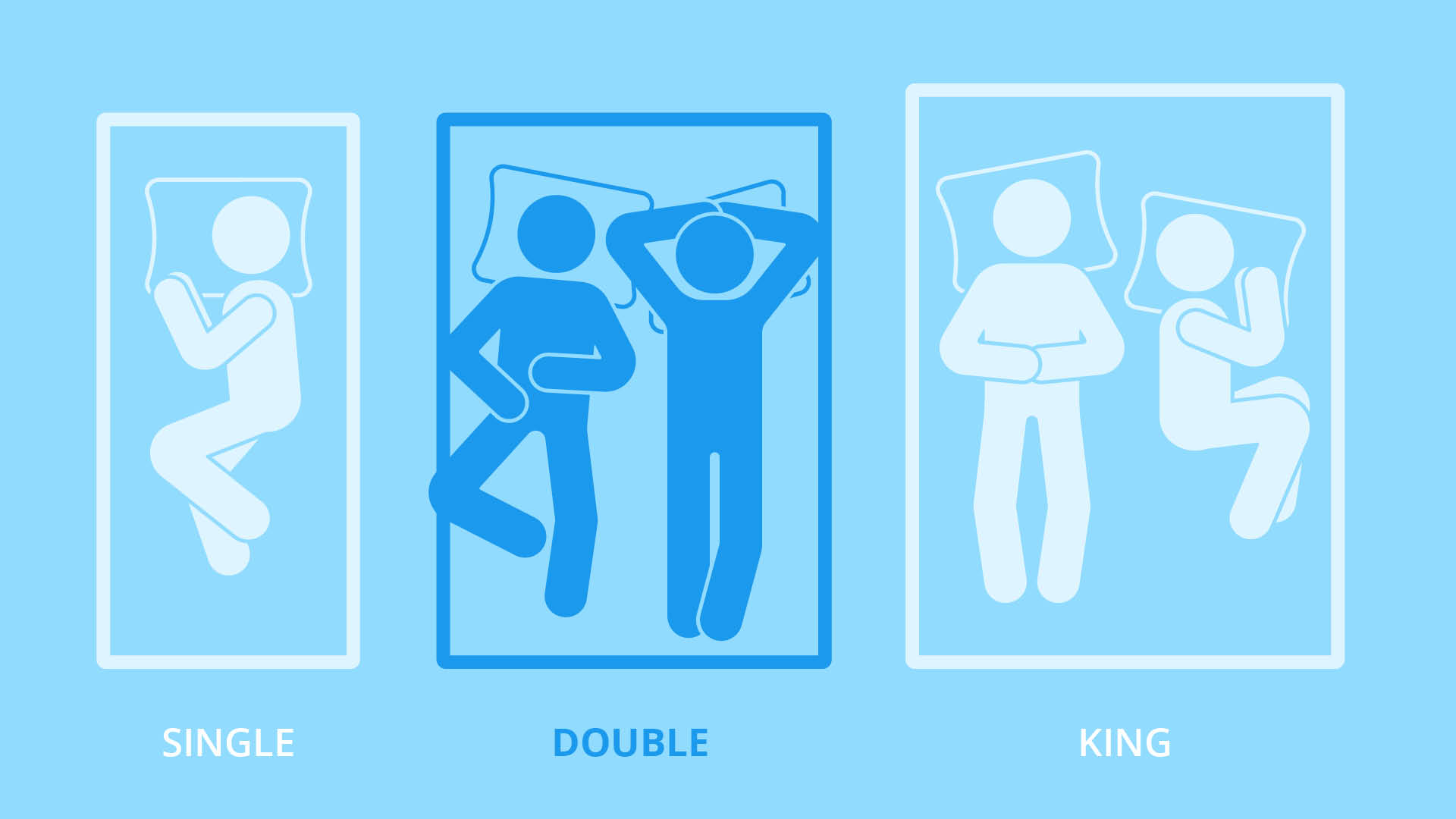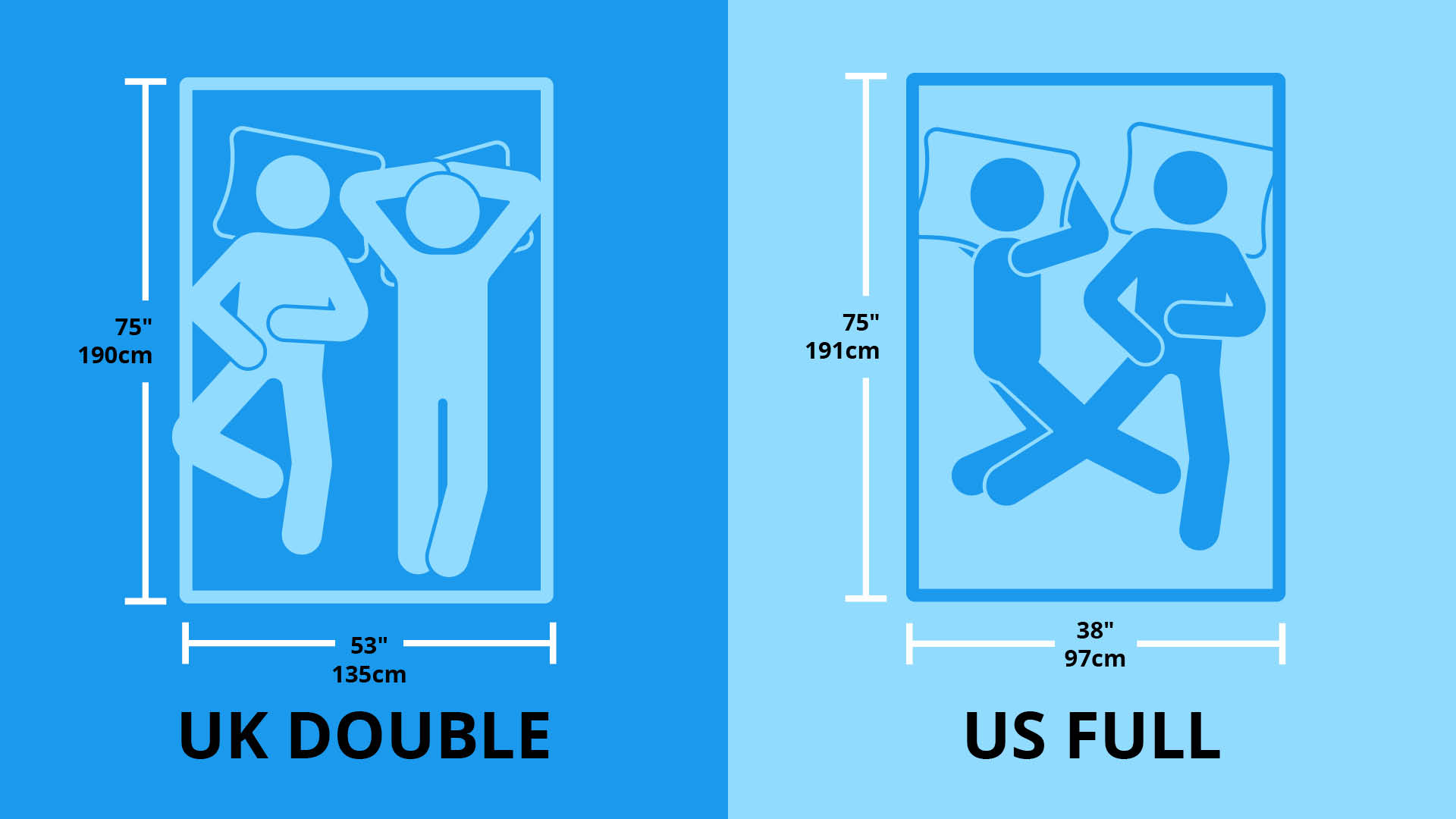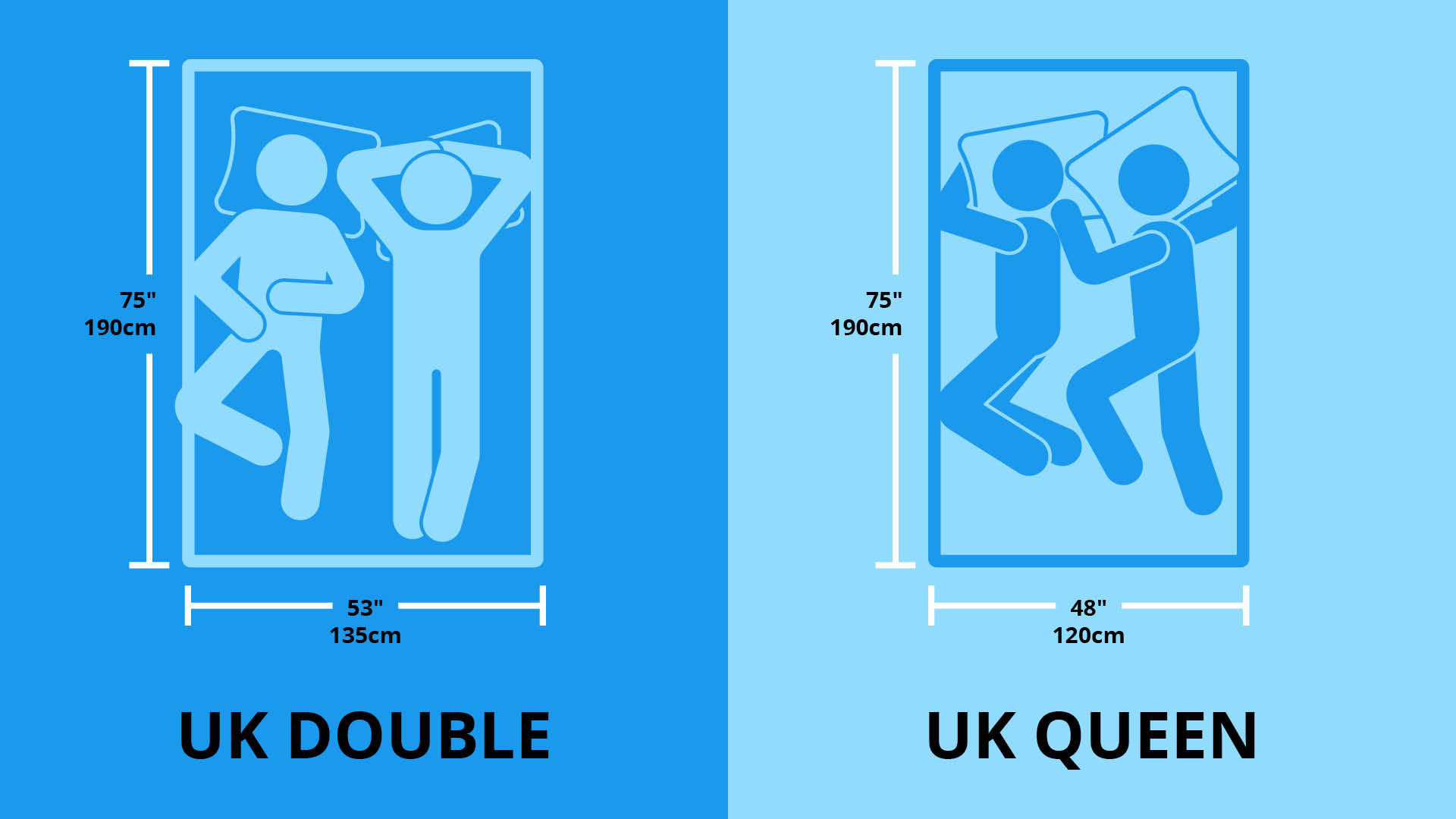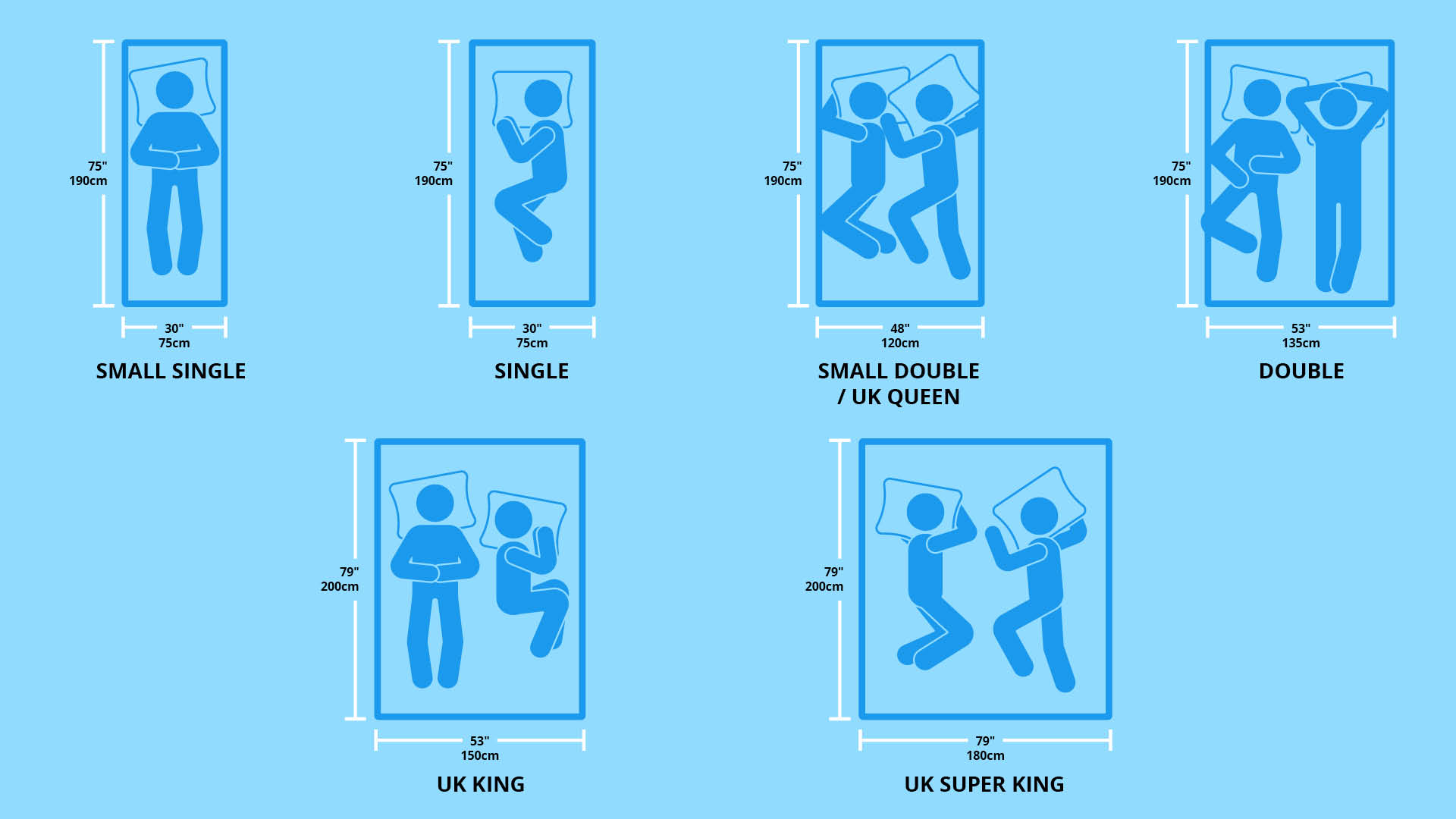
If you're buying a bed and/or a mattress, then it's important to know what size you're looking for. There are a number of sizes to choose from, and they vary from country to country, so you need to get it right. In this article, we'll explain exactly what's meant by a 'double': how large it is, how it compares to other mattress sizes, and how a UK double differs from a US double. That will help you decide whether a double is the best mattress for your needs.
At 135cm wide and 190cm long (approximately 53 inches wide and 75 inches long) a UK double is one of the most popular mattress sizes, because it sits in between smaller standard sizes (small single, single or small double) and the larger sizes (king bed size and super king).
That makes a double a good compromise in terms of space it affords sleepers and the space the bed takes up in a room, as well as being one of the more affordable sizes, especially if you can bag a bargain in the mattress sales.
What are the dimensions of a double size bed?
A double size bed is 135cm wide and 190cm long (approximately 53 inches wide and 75 inches long).
How big is a double size bed?
In the UK, a double-size bed is 135cm wide and 190cm long (approximately 53 inches wide and 75 inches long). That makes it wider than a queen size bed, aka a small double, which is 120 x 190cm (approximately 48 x 75 inches), but the same length. Conversely, a double-size bed is 15cm narrower and 10cm shorter than a king, which is 150 x 200cm (approximately 60 x 203 inches).
This in-between size makes a double a good choice for single people who want extra space in bed. For example, compared with a single size bed (90cm x 190cm, approximately 36 x 75 inches), you'll be getting 50 per cent more width; an extra 45cm from side to side. And compared with a queen/small double, you'll be getting an extra 15cm.
Conversely, some couples might prefer a double mattress because it's big enough to accommodate both partners, while allowing more free floor space than a king (150cm x 200cm, approximately 60 x 79 inches) or super king (180cm x 200cm; approximately 71 x 79 inches). This makes it a particularly good option in homes with smaller bedrooms, or for guest rooms.
All things being equal, double mattress will also be cheaper than a king or super king, making it a more appropriate purchase, for instance, if you're a new couple in a starter home.
Sign up to get the BEST of Tom's Guide direct to your inbox.
Get instant access to breaking news, the hottest reviews, great deals and helpful tips.
| Header Cell - Column 0 | Size (metric) | Size (imperial) |
|---|---|---|
| Double | 135 x 190cm | 53 x 75 inches |
| Small double | 120 x 190cm | 48 x 75 inches |
| US full | 137 x 191cm | 54 x 75 inches |
Double vs full size: what's the difference?
What's the difference between a double in the UK and USA? The short answer is, not much, but there is a difference.
A US double, also known as a full size mattress, is almost the same size as a UK double. A UK double is 135cm wide and 190cm long (approximately 53 inches wide and 75 inches long). A US double or full is 54 inches wide and 75 inches long (approximately 137cm wide and 191cm long). In other words, a US double/full is just a couple of centimeters wider and about a centimeter longer than a UK double.
How does a US double/full sit within the line-up of standard American sizes? Well, the next step up in size from a US double is a US queen, which measures 60 x 80 inches (approximately 152 x 203cm), making it both wider and longer. The next step down is a twin XL, which is 38 inches wide and 80 inches long (approximately 97cm wide and 203cm long). That makes a twin XL narrower by 16 inches but also longer by five inches than a US double/full.
Narrower still, but the same length as a US double/full is a twin size mattress, which is 38 inches wide and 75 inches long (approximately 97cm wide and 191cm long).
What about Europe? Quite simply, there is no direct equivalent to either the UK double or US double/full in the EU. The closest size is the Euro double, which measures 140 x 200cm (approximately 55 x 78 inches), making it 5cm wider and 10cm longer than a UK double.

Small double mattress size
In the UK, a small double is 120 wide and 190cm long (approximately 48 inches wide and 75 inches long). It's also known as a UK queen.
A small double is 15cm narrower than a double, which is 135cm (approximately 53 inches) wide, but the same length. That means a small couple is not suitable for couples. However, this size has recently been growing in popularity as it's useful for spare rooms (especially those on the small side) and for older children or teenagers who want more space to spread out in bed.

Double vs king size bed dimensions
In the UK, a king size bed is 150cm long and 200cm wide (approximately 60 inches long and 79 inches wide. That makes it significantly bigger than a UK double, which is 135cm wide and 190cm long (approximately 53 inches wide and 75 inches long). A UK king is 15cm wider and 10cm longer than a UK double.
Both a UK double and a UK king are suitable for couples, but a UK king gives you more space to spread out in bed. It's also a better bet for taller people who don't want their toes hanging off the end of the bed.
Conversely, a UK double's more compact dimensions will make it a more practical choice for small bedrooms and guest rooms. A double will also normally be a option cheaper than a king.

Single vs double bed size
A UK single is 90cm wide and 190cm long (approximately 36 inches wide and 75 inches long). A UK double is 135cm wide and 190cm long (approximately 53 inches wide and 75 inches long). In other words, a UK double is the same length as a UK single but a third wider.
As the name suggests, a single mattress is only suitable for one person, whereas a double can accommodate two. That said, doubles are also popular for singles, including older children, teenagers and adults, who want more space in bed.
That extra space will, of course, come at a cost; both monetarily and in terms of the floor space the bed will take up in your bedroom. Conversely, single mattresses will be more suitable for smaller children, who might feel 'lost' in a double bed.
Tom regularly writes about sleep for Tom's Guide and our sister site T3.com. Over the years he's tested a number of mattresses, duvets and pillows, and as a back pain sufferer, has a keen interest in finding ones that offer maximum support. Plus, in running a successful Airbnb business, sleep hygiene and providing the right bedding for guests has become a big part of his day-to-day life.

